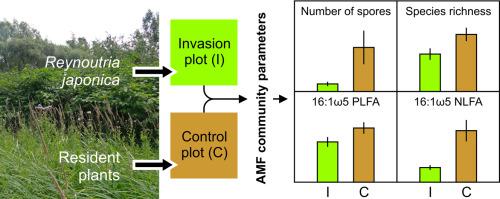Applied Soil Ecology ( IF 4.8 ) Pub Date : 2021-08-10 , DOI: 10.1016/j.apsoil.2021.104152 Szymon Zubek 1 , Paweł Kapusta 2 , Małgorzata Stanek 2 , Marcin W. Woch 3 , Janusz Błaszkowski 4 , Anna M. Stefanowicz 2

|
Reynoutria japonica (Japanese knotweed) is one of the most potent global invasive plant species; however, there is still insufficient knowledge on the impact of its invasion on arbuscular mycorrhizal fungi (AMF, Glomeromycota). The aim of our study was to assess the condition of AMF communities under the influence of R. japonica and determine the temporal and site-dependent variability of this influence. We studied AMF spore number, species richness, and composition as well as biomass in pairs of adjacent plots encompassing R. japonica and resident plant species. We established these pairs of plots in different habitat conditions (light and heavier soil conditions), and we sampled them four times (two spring and two summer seasons) to check if the potential impact of the invader on AMF communities is soil- and/or season-dependent. We found that the invasion reduced AMF spore number, species richness, and biomass, but had no effect on AMF species composition. AMF parameters varied over time (spore number, species composition and biomass) and depended on soil condition (species richness), but were barely affected by interactions between the studied factors. The lower performance of AMF communities in R. japonica plots was probably due to the displacement of resident mycorrhizal plant species. This displacement was not complete as some mycorrhizal plants, especially spring ephemerals, managed to survive the invasion. These were probably responsible for the maintenance of AMF communities in the patches of R. japonica. In conclusion, AMF communities are negatively affected by the invasion, but R. japonica does not entirely eliminate AMF, which is optimistic from the viewpoint of restoring sites invaded by this non-mycorrhizal alien plant species.
中文翻译:

无论季节和土壤条件如何,Reynoutria japonica 入侵都会对丛枝菌根真菌群落产生负面影响
Reynoutria japonica(日本虎杖)是最有效的全球入侵植物物种之一;然而,关于其入侵对丛枝菌根真菌(AMF,Glomeromycota)的影响仍知之甚少。我们研究的目的是评估 AMF 群落在R. japonica影响下的状况,并确定这种影响的时间和地点相关变异性。我们研究了 AMF 孢子数、物种丰富度、组成以及包含R. japonica的相邻地块中的生物量和常驻植物种类。我们在不同的栖息地条件(轻质和重质土壤条件)中建立了这些对地块,我们对它们进行了四次采样(两个春季和两个夏季),以检查入侵者对 AMF 群落的潜在影响是否是土壤和/或季节依赖。我们发现入侵减少了 AMF 孢子数、物种丰富度和生物量,但对 AMF 物种组成没有影响。AMF 参数随时间变化(孢子数、物种组成和生物量)并取决于土壤条件(物种丰富度),但几乎不受研究因素之间相互作用的影响。R. japonica AMF 群落的低表现地块可能是由于常驻菌根植物物种的迁移。这种迁移并不完全,因为一些菌根植物,尤其是春季短命植物,设法在入侵中幸存下来。这些可能负责维护粳稻斑块中的 AMF 群落。总之,AMF群落受到入侵的负面影响,但R. japonica并没有完全消除AMF,从恢复这种非菌根外来植物物种入侵的地点的角度来看,这是乐观的。



























 京公网安备 11010802027423号
京公网安备 11010802027423号